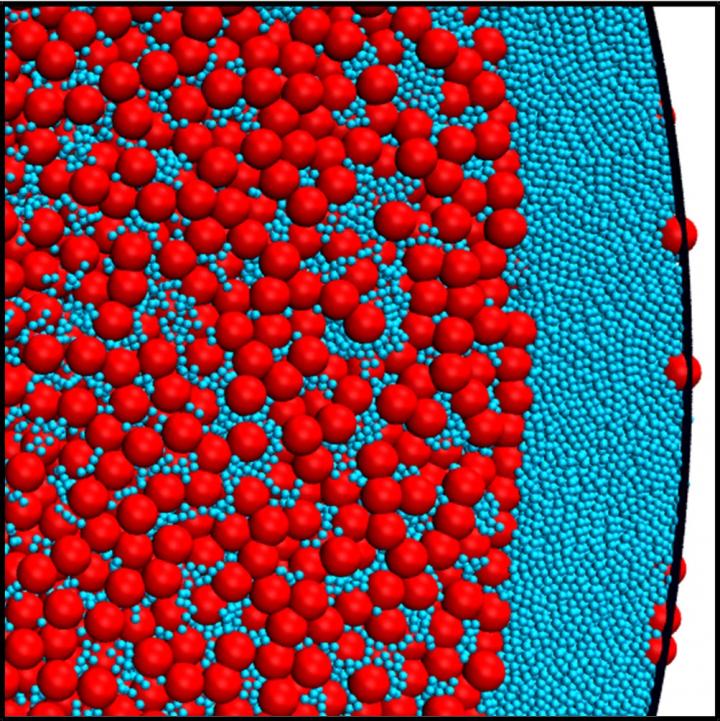German Research Foundation to sponsor a new research training group in physics and chemistry; cooperation between Mainz University, TU Darmstadt, and the Max Planck Institute for Polymer Research

Credit: Ill./©: Midya Jiarul, JGU
Wall paint, toothpaste, all types of plastic – as varied as these products are, they all belong to the group of materials known as soft matter. Whether they are naturally or synthetically produced, soft materials are ubiquitous and we use them all the time. New developments in medical technology, energy storage, and information technology also exploit soft materials characterized by complex, often nanoscale hierarchical structures. These structures can be exploited to create specific material properties. A new research training group funded by the German Research Foundation (DFG) combines the disciplines of physics and chemistry to explore the role of interfaces in the synthesis of soft advanced materials and how these interfaces influence their resulting properties. “Our aim is to better understand self-organization processes in the presence of interfaces so that we can subsequently manipulate them,” explained Professor Thomas Speck, coordinator of the new DFG Research Training Group at Johannes Gutenberg University Mainz (JGU). The Max Planck Institute for Polymer Research (MPI-P) in Mainz and Technische Universität Darmstadt participate in the new Research Training Group 2516 “Control of structure formation in soft matter at and through interfaces,” which the DFG will fund to the tune of some EUR 3 million over the coming four-and-a-half years. The project is scheduled to start in July 2020.
“With the high quality of its application, Johannes Gutenberg University Mainz once more convinced the German Research Foundation and I congratulate all those involved in this achievement. The establishment of the new Research Training Group will promote innovative research programs in the field of soft matter and contribute to the development of young researchers. Thanks to the involvement of the Max Planck Institute for Polymer Research in Mainz and Technische Universität Darmstadt as strategic cooperation partners, early career researchers will have access to the best facilities in the Rhine-Main region. This will further enhance Mainz as a science hub,” added Professor Konrad Wolf, Minister of Science, Continuing Education, and Culture in Rhineland-Palatinate.
Interfaces are used routinely to control and accelerate processes in chemical or physical applications of soft matter. “It is thus important that we manage to tailor the functioning and the responsiveness of interfaces to our precise requirements,” said Professor Thomas Speck. By means of predefining an interface it is possible, for instance, to manipulate the linking of molecules so that the self-organization process then follows a specific plan. As a result, soft materials can be produced that have very specific mechanical, optical, or electronic properties. So-called smart gels, for example, react to the minutest of temperature changes by means of a major change in volume. Exactly how this process can be controlled during the manufacturing process is still largely unclear. “Our new DFG Research Training Group will be undertaking fundamental research to gain a better understanding of such processes,” said Speck, who also coordinates JGU’s Mainz Institute of Multiscale Modeling (M3ODEL), a Top-level Research Area at Mainz University funded by the Research Initiative of the State of Rhineland-Palatinate.
Training concept to provide consistent networking of theory and experiment
The physicists and chemists at the universities of Mainz and Darmstadt and at the Max Planck Institute for Polymer Research have given special attention to the training concept. A total of nine doctoral candidates will be supervised by four project managers from the theoretical field and four from the experimental field, ensuring a consistent integration of theoretical and experimental work.
This builds on the long-standing tradition of research into soft matter at Mainz and Darmstadt. Johannes Gutenberg University Mainz and TU Darmstadt also cooperate in the Rhine-Main Universities (RMU) strategic alliance, with Goethe University Frankfurt being the third partner.
###
Media Contact
Dr. Thomas Speck
[email protected]
49-613-139-26915
Original Source
http://www.




